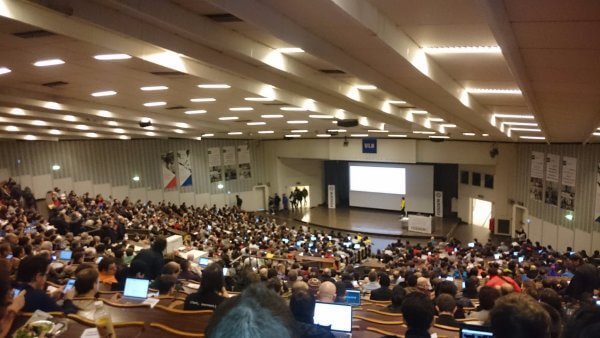I spent the weekend at Free and Open Source Software Developers’ European Meeting, or as it is better known: FOSDEM – as I did in the past several years as well. This time I delivered two presentations on syslog-ng, and as usual, I spent the rest of the time in devrooms and in the exhibition areas.

Both of my talks were late in the afternoon. This usually means fewer attendees, who are also too tired to actively participate. But not this time. I gave my presentation in a packed auditorium both times. My first talk was about scaling central log management, and I was happy to learn that Gartner also found this topic important enough to dedicate a report to the topic recently. The other presentation was about parsing security-related log messages using syslog-ng.
The best part of giving talks is that they do not end with the final slide. The most interesting part comes right after that: Q&A and discussion. Disk-based buffering was added to syslog-ng OSE with version 3.8 and I learned about an interesting possible use case: collecting logs on an airplane during flight and sending them to the destination upon landing. Another hot topic was European privacy regulations: personal data has to be anonymized, which then makes analysis difficult. Luckily, syslog-ng can not only overwrite sensitive parts of the message with a constant string, but can also replace it with a unique hash generated from the sensitive information, to facilitate log analysis.
Video recordings of my talks will be available soon, I’ll post them on Twitter and LinkedIn as soon as they are available.
Two busy days
Because my talks were late in the afternoon, instead of looking around in the wonderful city of Brussels, I was at the venue from right after breakfast. There were over 20 tracks in parallel, and plenty of exhibitions, so choosing where to wasn’t easy. My primary interests were community and security and of course anything related to non-x86 architectures.
One of my favorite talks was by Georg Greve, CEO of Kolab Systems, who – as a head of a software company – talked about hardware. Why open hardware (in this case OpenPower) is important, and why the free software community should be aware about the increasingly closed nature of hardware products.
Another interesting hardware was an ARM Linux laptop by Olimex. It is not really a high-end machine, but both hardware and software are completely open-source.
Many people started using Linux with the help of the excellent guides from SUSE. They are still a core part of the SUSE experience, and Christoph Wickert explained the tools and the workflows of document creation.
Another interesting topic by SUSE was continuous integration using the openSUSE Build Service. If your source code is on GitHub, you can build and test your application on each commit.
I spent most of the second day in the community devroom, learning about measuring community activity (focusing on developers), conflict handling and how to fix problems. When I wanted to switch to the security devroom, I could not enter as it was packed to the brim. Once I got in, I listened to a presentation about TLS implementation testing and also gave my talk about syslog-ng.
By the end of the second day I was completely exhausted, but full of new experiences. See you at the next FOSDEM!




-

alllen90
-
Cancel
-
Vote Up
0
Vote Down
-
-
More
-
Cancel
Comment-

alllen90
-
Cancel
-
Vote Up
0
Vote Down
-
-
More
-
Cancel
Children